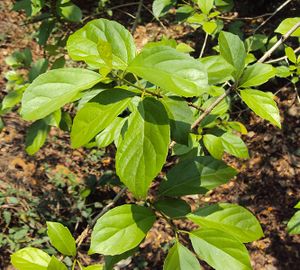Note: This is a project under development. The articles on this wiki are just being initiated and broadly incomplete. You can Help creating new pages.
Premna serratifolia - Ganakasika
Premna serratifolia is a small shrub in the Verbenaceae family. It flowers and fruits between May and November. During flowering season, it attracts a large number of butterflies and bees.
Contents
[hide]- 1 Uses
- 2 Parts Used
- 3 Chemical Composition
- 4 Common names
- 5 Properties
- 6 Habit
- 7 Identification
- 8 List of Ayurvedic medicine in which the herb is used
- 9 Where to get the saplings
- 10 Mode of Propagation
- 11 How to plant/cultivate
- 12 Commonly seen growing in areas
- 13 Photo Gallery
- 14 References
- 15 External Links
Uses
Fever, Arthritis, Colic, Flatulence, Cough, Headaches, Backaches, Neuralgi, Sore throats
Parts Used
Chemical Composition
P-methoxy cinnamic acid, linalool, linoleic acid, β-sitosterol and flavone luteolin, iridoid glycoside, premnine, ganiarine and ganikarine, premnazole, aphelandrine, pentacyclic terpene betulin, caryophellen, premnenol, premna spirodiene, clerodendrin-A, etc., phytoconstituents in its various parts[1]
Common names
| Language | Common name |
|---|---|
| Kannada | ಅಗ್ನಿಮನ್ಥ Agnimantha |
| Hindi | Arani |
| Malayalam | Appa |
| Tamil | Pacu-munnai, Munnai |
| Telugu | Bhairavi |
| Marathi | Arani, Ranatakali |
| Gujarathi | NA |
| Punjabi | NA |
| Kashmiri | NA |
| Sanskrit | Agni-mantha, Arani |
| English | Headache tree, Spinous fire brand teak |
Properties
Reference: Dravya - Substance, Rasa - Taste, Guna - Qualities, Veerya - Potency, Vipaka - Post-digesion effect, Karma - Pharmacological activity, Prabhava - Therepeutics.
Dravya
Rasa
Tikta (Bitter), Kashaya (Astringent)
Guna
Laghu (Light), Ruksha (Dry), Tikshna (Sharp)
Veerya
Ushna (Hot)
Vipaka
Katu (Pungent)
Karma
Kapha, Vata
Prabhava
Habit
Identification
Leaf
| Kind | Shape | Feature |
|---|---|---|
| Simple | Opposite | Petiole 4-14 mm, slender, pubescent, grooved above |
Flower
| Type | Size | Color and composition | Stamen | More information |
|---|---|---|---|---|
| Bisexual | 2-4cm long | Greenish-white | 4 | Flowers Season is June - August |
Fruit
| Type | Size | Mass | Appearance | Seeds | More information |
|---|---|---|---|---|---|
| General | 7–10 mm | Fruit a drupe, seated on the calyx, globose, purple | Seeds oblong | {{{6}}} |
Other features
List of Ayurvedic medicine in which the herb is used
Where to get the saplings
Mode of Propagation
How to plant/cultivate
Found in the wild on sandy soils and limestone[3]
Commonly seen growing in areas
Forest regrowth, At brushwood and hedges, Near to sea area.
Photo Gallery
References
External Links
- Ayurvedic Herbs known to be helpful to treat Fever
- Ayurvedic Herbs known to be helpful to treat Arthritis
- Ayurvedic Herbs known to be helpful to treat Colic
- Ayurvedic Herbs known to be helpful to treat Flatulence
- Ayurvedic Herbs known to be helpful to treat Cough
- Ayurvedic Herbs known to be helpful to treat Headaches
- Ayurvedic Herbs known to be helpful to treat Backaches
- Ayurvedic Herbs known to be helpful to treat Neuralgi
- Ayurvedic Herbs known to be helpful to treat Sore throats
- Herbs with Leaves used in medicine
- Herbs with Seeds used in medicine
- Herbs with Ripe fruits used in medicine
- Herbs with common name in Kannada
- Herbs with common name in Hindi
- Herbs with common name in Malayalam
- Herbs with common name in Tamil
- Herbs with common name in Telugu
- Herbs with common name in Marathi
- Herbs with common name in Sanskrit
- Herbs with common name in English
- Habit - Shrub
- Index of Plants which can be propagated by Seeds
- Index of Plants which can be propagated by Cuttings
- Herbs that are commonly seen in the region of Forest regrowth
- Herbs that are commonly seen in the region of At brushwood and hedges
- Herbs that are commonly seen in the region of Near to sea area
- Herbs
- Ayurvedic herbs that don't have flower, fruit and leaf photos
- Lamiaceae








